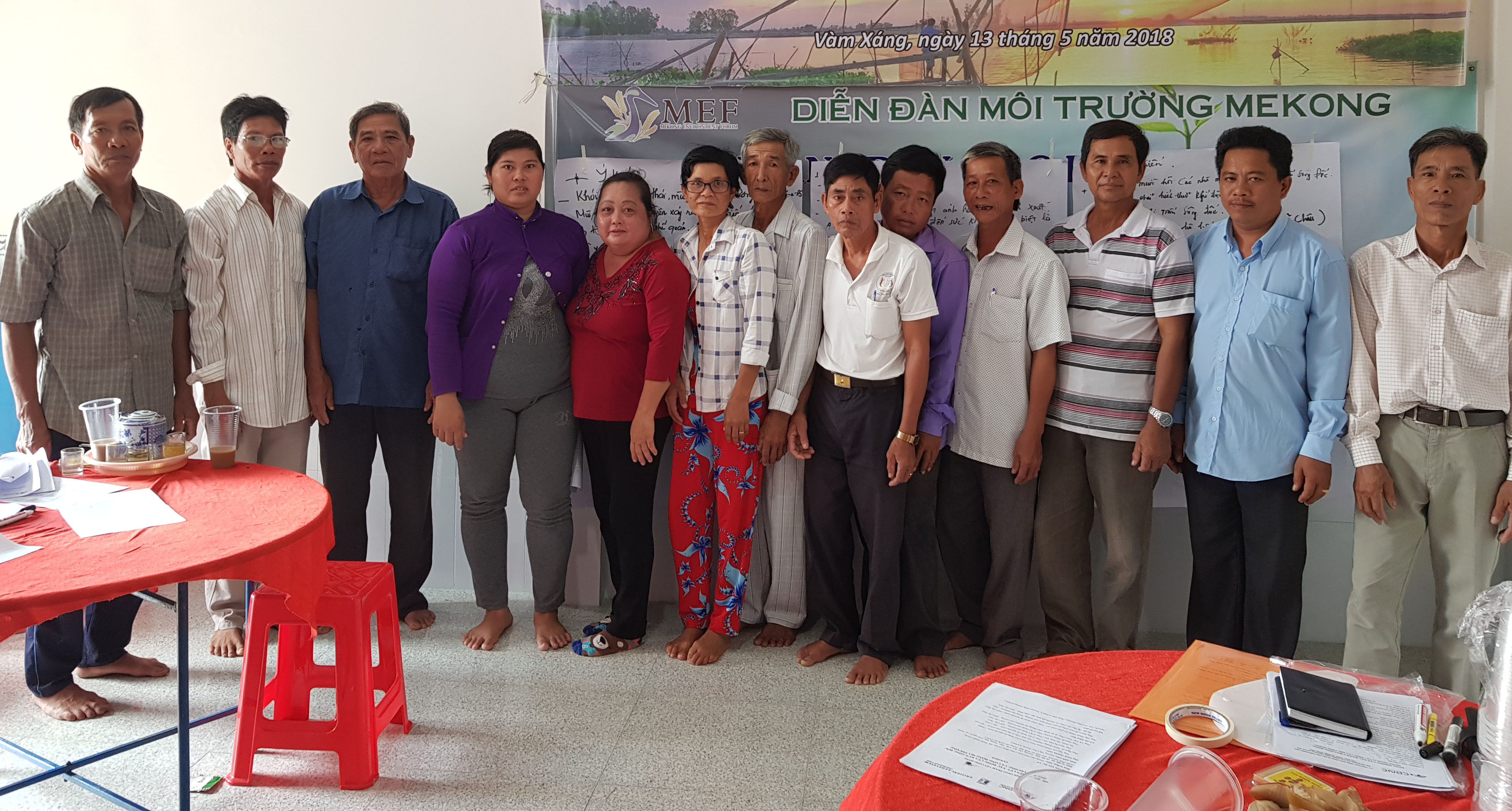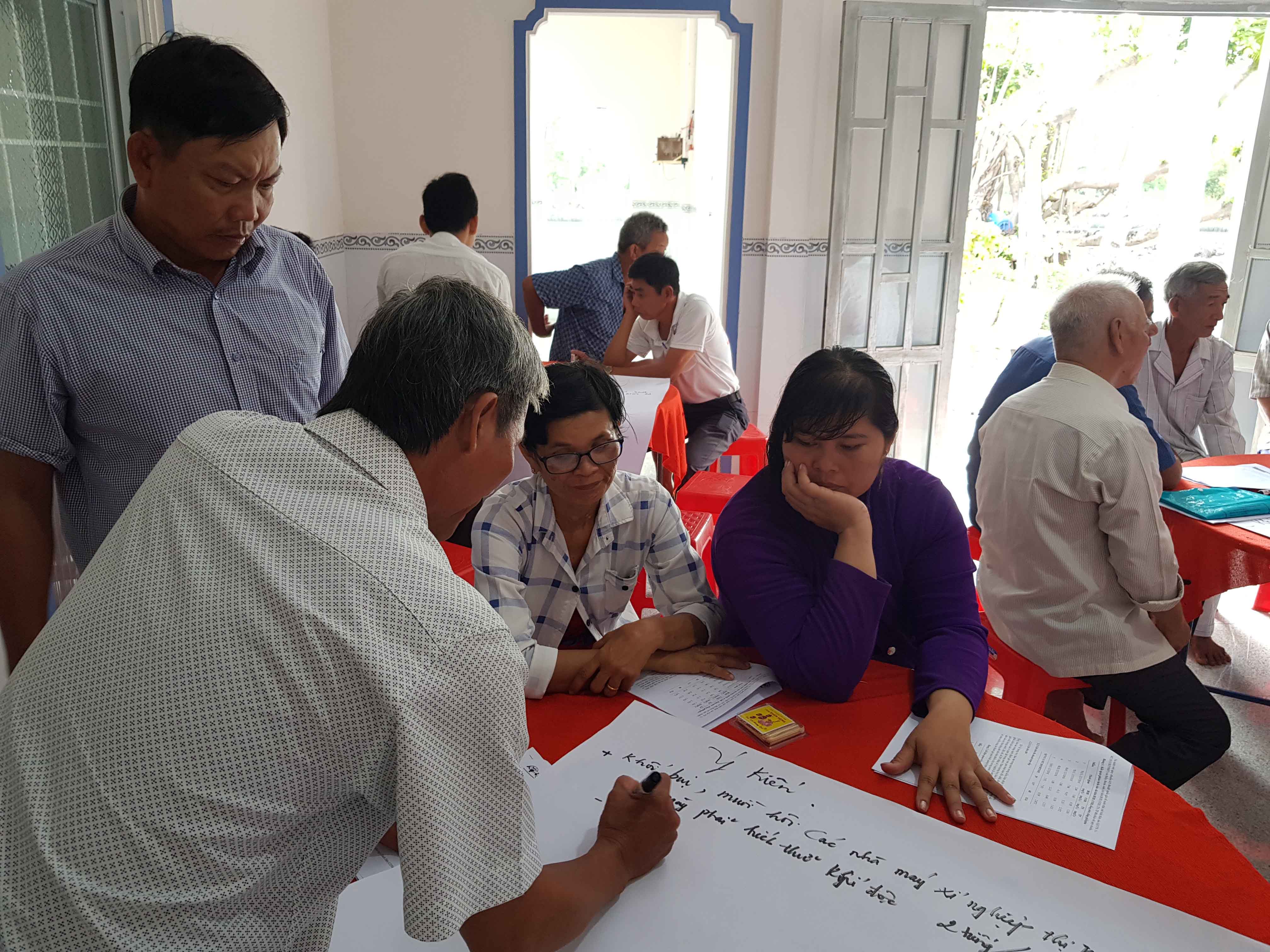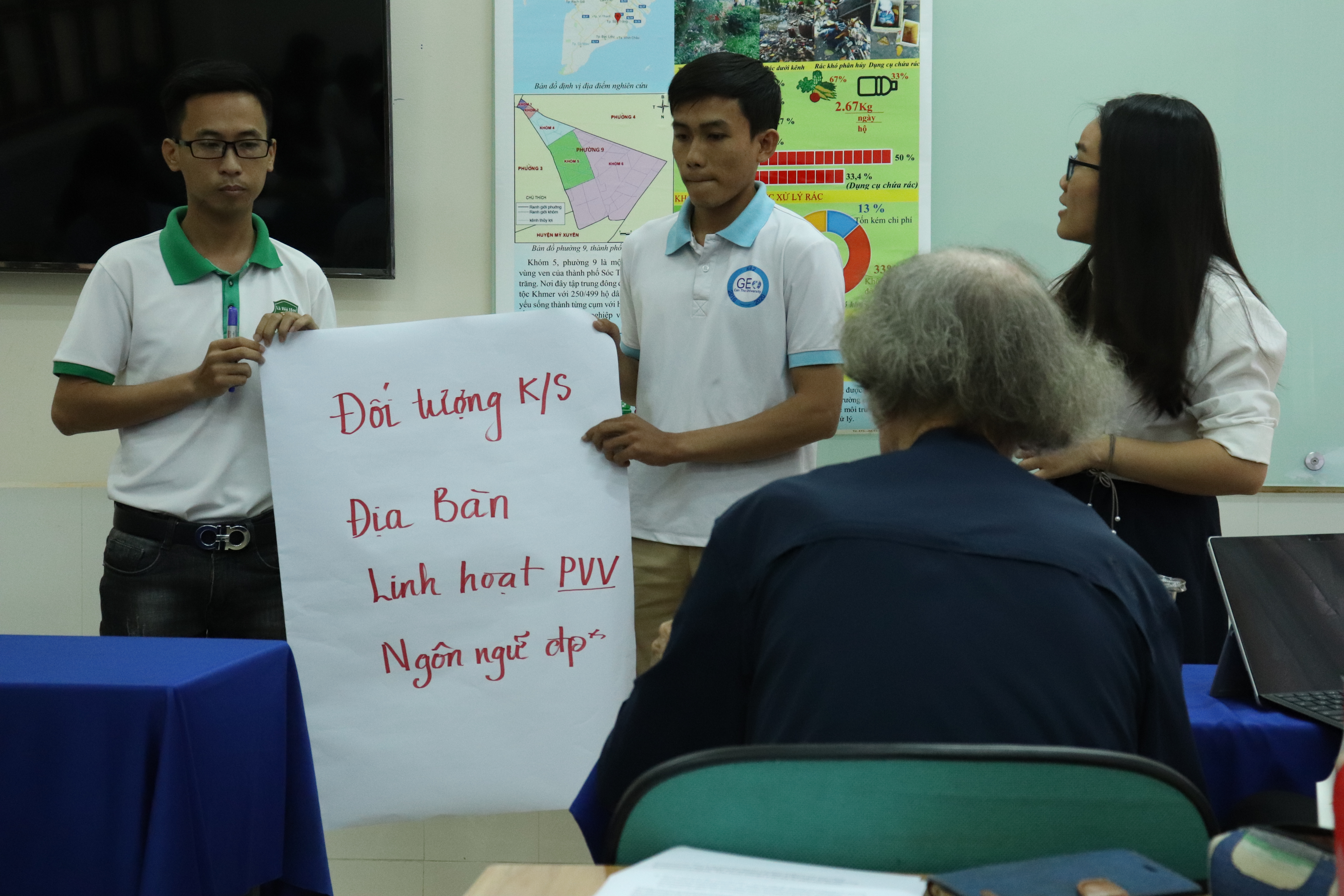Building "Citizen Science" Community for Sustainable Development in the Mekong Delta.
 |
Mekong Environment Forum | |
 |
Quang Nguyen Minh | |
 |
http://www.mekongenvironmentforum.org | |
 |
US$4500 |
Research Background Final Report (abstract) Others

Team member

Workshop with local stakeholders.
Research Background
The Mekong Environment Forum creates Citizen Science workshops to effectively educate and to
engage local farmers and fishermen so that they have the tools to better address and assess the
impact of climate change in their respective provinces. The workshops are designed to help locals
develop the skill sets for scientific data gathering and to improve partnerships between local
communities and scientists in a way that ultimately empowers local stakeholders.
The key projects include a series of workshops to be held in Can Tho and in-the-field research in
cooperation with locals and students from Can Tho University. Citizen Science field training offers a
framework for cultivation of local knowledge and skills that will contribute to the creation of
sustainable environmental policy. The best outcome from the research and workshops is to publish
an adoptable citizen science pilot training curriculum and to familiarize local stakeholders with data
management, quality control, and open data principles. From this successful pilot Citizen Science
program, there's also the objective to create a Vietnam Citizen
Science Association.
For generations peasants in Vietnam's Mekong Delta have always completely relied on the
Mekong's nutritious water and fish resources for their subsistence, with very little margin for error.
But things are changing very fast for them, and not only positively. Climate change effects and
ill-conceived industrial projects cause serious environmental changes, threatening local livelihoods
and ecosystems, water and food security. To make matters worse, local communities'
non-sustainable practices, including ground-water over-exploration, add another danger to this
environmental insecurity risk.
While local authorities remain perplexed about the right way to sustain local community
development, the Mekong Environment Forum has shifted attention to the emergence of grassroots
sustainability initiatives. These civil society networks display the potential to implement social
innovation and change processes from the 'bottom up'. We recognize that non-governmental actors'
effective engagement in community capacity building demonstrates that they can better address
challenges that government authorities sometimes cannot solve by itself. Furthermore, local people
hold both the ability and desire to shift their attitudes and lifestyle choices to align with a more
sustainable future. However, local communities, especially smallholder farmers, are facing
difficulties to assess to, and remain usually marginalized in, policy process. This leads to the
prevailing mismatches between climate response policy and local farmers' needs.
Thus, the research project aims to:
- Raise the visibility of the deplorable environmental, economic and human rights impacts climate change and non-sustainable practices.
- Build "transformative learning" groups comprising enthusiastic farmers to empower.
community's full participation in improving local livelihoods and environment through
post-workshop experience sharing and mutual assistance activities.
-Look for and promote better water and energy options.
Introduce some climate-resilient livelihood models and success stories from farmers to
promote alternative solutions and recommendations for local government's development
planning and policy making.
[Sep. 2018]

Workshop at new resettelment sites.
Final Report (abstract)
Communities in Vietnam's Mekong Delta are most vulnerable to the negative impact of environmental changes, due to their heavy dependence on natural resources of water, soil, weather, and flora and fauna. Local government authorities have proactively introduced a number of environmental policies in the recent past in search for sustainable development. However, limited resources and climate governance capacity have challenged and impeded their efforts to mitigate and adapt to the tangible impacts of climate and human-caused environmental changes.
This project, funded by the Takagi Fund for Citizen Science, was designed to create citizen science workshops to effectively educate and to engage local farmers and fishermen so that they have the tools to better address and assess the impact of climate change in their respective provinces. Three professional training workshops were hold in central city of Can Tho from April to August 2019 and brought together 80 participants from local communities, government agencies, research institutes, and media outlets. The training themes covered citizen science and digital conservation, field-based data and evidence production, field research skills and ethics, and environmental data journalism. Four foreign experts and
three journalism trainers have taken part in the project as trainers.
The key training approach includes "transformative learning" and "learning by doing". Particularly, three citizen science teams, 8-12 members each, were established under intensive fieldwork supervision from the trainers and project advisors. Each team consists of university students, community representatives, government officials and early-career journalists. They have been carefully trained in the project's training workshops and conducted eight post-workshop fieldwork activities during the course of the project. Eight data-sets and media contents were produced and uploaded to the Mekong Environmental Security Atlas (MESA) which can be reached at https://www.mekongcircular.org/maps-and-database/projects-ideas.Some fieldwork reports were published in Vietnamese and international magazines to help put the spotlight on vital issues threatening the Mekong Delta and the citizen science's efforts that are being made in response. The MESA serves as a way to connect local citizen scientists and share their information.
The project invited six government officials to engage in field research in order to deepen their commitment to the environment by working with and supporting our teams. By doing so, the project empowered them to become more involved in environmental protection and sustainable development at the local level. Our aim is for the local policymakers to recognize the importance of citizen scientists and apply the data collected to conservation rules and regulations.
Citizen science is increasingly being recognized in Vietnam as a 'collective strategy' to raise awareness about important issues and promote science-based decision making. Smartphones allow anyone to timely report environmental issues facing their life and ecosystem. Scientists, policy-makers and media outlets are embedding dataset produced by local citizens in their work. With an aim of building capacity for local communities to raise awareness to the public on the climate and human-caused impacts on local ecosystems, this project is helping these communities find their voice and become agents of change.
[Feb. 2020]
Others
